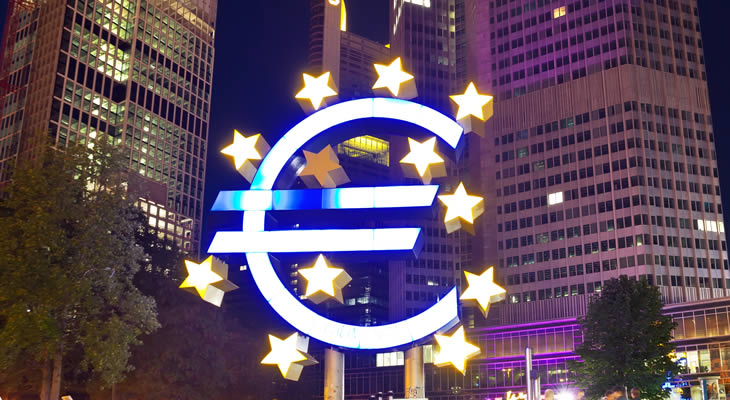The Pound Sterling to Euro (GBP/EUR) exchange rate was trending within a limited range on Wednesday morning.
With a complete absence of British economic data to provoke volatility, the Pound edged lower versus most of its major peers. The declination can be attributed to political unknowns as the forthcoming general election weighs on investor confidence.
The single currency, meanwhile, softened versus the majority of its most traded currency rivals as traders await the European Central Bank (ECB) rate decision. The common currency depreciation can be linked to geopolitics in Europe as Greece and Eurozone officials have still yet to find common ground to deal with Greece’s financial woes.
The Pound Sterling to Euro (GBP/EUR) exchange rate is currently trending in the region of 1.3880.
Yesterday…
The Pound Sterling to Euro (GBP/EUR) exchange rate softened by around -0.14% on Tuesday morning.
After UK economic data showed inflation remained on the fringe of negative territory and core inflation declined, the Pound depreciated versus the majority of its most traded currency rivals. Additional declination can be attributed to dampened investor confidence as the forthcoming general election stirs up political uncertainties.
The shared currency, meanwhile, continues to struggle versus most of its major peers with the geopolitical situation between Greece and Eurozone officials showing no sign of resolution. The decline has been somewhat slowed, however, thanks to positive domestic data results.
The Pound Sterling to Euro (GBP/EUR) exchange rate is currently trending in the region of 1.3855.
Pound Sterling (GBP) Exchange Rate Softens on Disappointing Data
With the general election fast approaching, the Pound is unlikely to sustain any significant gains. This is due to political uncertainties being amplified by opinion polls producing varied results and showing no clear majority for either of the major parties. Should any party but the Conservatives win, the UK will be subject to a massive policy overhaul. Even if the Tories do gain victory, Britain’s future in the European Union will be put to vote.
Aiding the Sterling slide was disappointing domestic data results. March’s Consumer Price Index remained at 0.0% on the year; hovering dangerously close to the first negative inflation rate since 1947. Perhaps of greater concern, given that low commodity prices can’t be blamed, was the downtrend in March’s Core CPI, which came in at 1.0%, down from the median market forecast figure of 1.2%.
The Office for National Statistics (ONS) stated; ‘In the year to March 2015, food prices fell by 3.2% and prices of motor fuels fell by 13.7%. In both cases, the falls were smaller than in the year to February but the 2 groups still provided the largest downward contributions to the 12-month rate for March.’
The Pound Sterling to Euro (GBP/EUR) exchange rate dropped to a low of 1.3834 today.
Euro (EUR) Exchange Rate Edges Lower on Potential Grexit
In general, the single currency has seen little impact from domestic data results with the mounting potential for a Greek exit from the Eurozone dominating investor focus. Many are starting to question the options left for the cash-strapped nation, with the new government seemingly alienating themselves from Eurozone officials with the ability to offer vital bail-out funds.
‘We have come to the end of the road… If the Europeans won’t release bailout cash, there is no alternative [to a default],’ one government official said.
Although European economic data hasn’t been particularly impactful, Tuesday’s positive results have slowed the single currency’s decline somewhat. March’s German Wholesale Price Index advanced by 1.0% on the month. Additionally, February’s Eurozone Industrial Production grew by 1.6% on the year, bettering the median market forecast advance of 0.8%.
Also preventing a larger Euro downtrend was a report from the European Central Bank (ECB) which indicated that quantitative easing was already spurring lending in the Euro area. ‘Euro-area banks indicated that they have used the additional liquidity from their sales of marketable assets related to the asset-purchase program over the past six months in particular for granting loans,’ the ECB said. ‘The asset-purchase program seems to be effective in supporting lending to the Euro-area economy.’
Pound Sterling to Euro (GBP/EUR) Exchange Rate Forecast to Hold Losses
Given that the Pound is unlikely to sustain any significant gains ahead of the general election, the Pound Sterling to Euro (GBP/EUR) exchange rate is likely to hold losses for the remainder of the European session. With that being said, however, any negative developments with Greece could see the shared currency resume bearishness.
Wednesday will be significant for those invested in the single currency with the ECB rate decision. However, given that quantitative easing is in its early stage and there are still so many unknowns regarding Greece, ECB policymakers are very unlikely to do anything dramatic.
The Pound Sterling to Euro (GBP/EUR) exchange rate climbed to a high of 1.3921 today.

